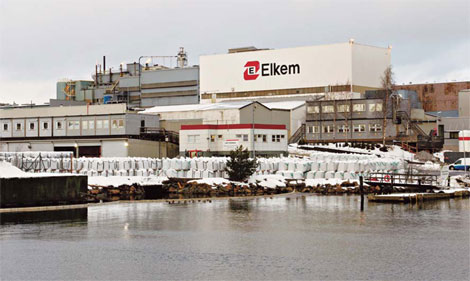Investment is a two-way street
Updated: 2011-12-09 08:10
By Fu Jing (China Daily)
|
|||||||||||
|
A general view of the Norwegian company Elkem's plant in Kristiansand, some 300 km south of Oslo on Jan 11. Norway's Orkla has agreed to sell its Elkem unit to China National BlueStar for $2 billion in one of the biggest industrial takeovers by a Chinese group in Europe. [Photo / Reuters] |
Gerard Lyons, chief economist of Standard Chartered Bank, has famously said that the three most important words in the past decade were not "war on terror" but "made in China".
Citing Lyons' point, European Commissioner for Trade Karel De Gucht recently said the openness of global markets since China's admission to the World Trade Organization (WTO) has helped transform the country into the world's second-largest economy, a position it achieved last year.
This is true but is only a partial picture of the past decade. De Gucht's comment would have been fairer if he had also noted that Chinese factories have provided numerous affordable goods to millions of European families and thousands of European investors have made large profits in China over the past decade thanks to the cheap labor.
In fact, over the past 10 years mutual benefits have always gone hand in hand with complaints and disputes, mainly starting from the European side.
But Chinese government officials and businessmen have not cringed at any conservative views.
Building upon their capital, technology and experiences accumulated over previous years, the Chinese are seeking new driving forces to run businesses and keep China's economy on a fast track.
While still focusing on foreign trade and investment, China is also shifting to domestic consumption and outward investment. And the China-European Union (EU) partnership at various levels has topped this agenda.
"This is a natural and mutually beneficial process," said Peng Xiancheng, president of Decision Chemical, a leading Chinese leather chemical producer and trader from Southwest China's Sichuan province. "Now China and Europe should enter into a marriage of capital and technology."
After more than a decade of development, Peng said his company has established a market network and mastered some key technologies in its field.
"But the most advanced environmentally friendly technologies are still in the hands of European companies," Peng said. "Some of the companies are struggling now and are eager to transfer their technologies."
To find ideal partners, Peng has sent two groups of experts to Spain, Italy, Belgium and Germany this year to hold talks with companies with appropriate technologies. "I hope we can make breakthroughs very soon," he said. "We are also considering setting up a factory in Europe."
In addition to newcomers such as Peng, there are many Chinese success stories in international business.
Related Stories
Role of WTO key to EU and China 2011-12-09 08:10
Leaders of China, EU urge better relations 2011-11-30 08:15
China surpasses US as EU's top trade partner: MOC 2011-10-16 16:46
EU, China should look beyond trade irritants 2011-09-17 15:34
- Chinese shares close lower after data release
- Passengers prepare for annual peak
- Home appliance sales in rural China up 66% in Nov
- Collective wage talks promoted
- Good things in store for Chinese life insurers
- Dotcom could fall into disuse
- Global supermarkets conquer China
- China's Nov CPI up 4.2%, PPI up 2.7%









